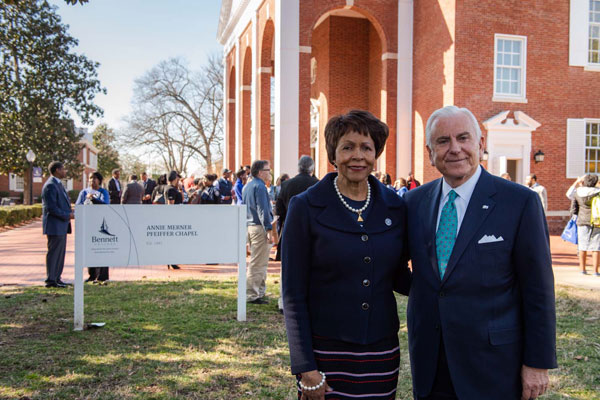
April 17, 2019; Q City Metro (Charlotte, NC)
Bennett College, one of only two all-women’s historically black colleges in the US, is still recovering from a near-death experience earlier this year. The threat, as some NPQ readers will recall, stemmed from the decision of Southern Association of Colleges and Schools Commission on Colleges (SACS) to recommend removal of Bennett’s accreditation on financial grounds.
It turned out, however, that Bennett had more supporters than even it might have imagined, with support coming from all quarters. In an interview with NPQ, Bennett College president Phyllis Worthy Dawkins estimated that more than 100 college presidents sent checks to Bennett. She added that at “Spellman and Benedict College, the leadership teams—board as well as president—sent personal checks.”
“This was like family,” Dawkins said. “Higher education family giving to other higher education institutions…it drew a momentum and a type of giving I’ve never seen and witnessed.”
One of the most extraordinary showings of support came from High Point University (HPU), located 18 miles away from Bennett. Calling an emergency faculty meeting, HPU president Nido Qubein obtained 94-percent approval from the 330 faculty in attendance to have the school make a $1 million donation to Bennett. While Bennett initially had set a $5 million fundraising goal, it ultimately raised more than $9.5 million from over 14,000 donors.
Sign up for our free newsletters
Subscribe to NPQ's newsletters to have our top stories delivered directly to your inbox.
By signing up, you agree to our privacy policy and terms of use, and to receive messages from NPQ and our partners.
Originally, it had been hoped that fundraising success, which effectively had recapitalized the college, would lead SACS to approve reaccreditation, but that did not happen. For now, Bennett’s accreditation remains in force until the courts rule, which could take years. As a backup plan, Bennett has also pursued accreditation on a fast track through the Transnational Association of Christian Colleges and Schools (TRACS), a national accreditor of religious colleges. Because Bennett is an affiliate of the United Methodist Church, it is eligible. In the past, other religiously affiliated historically black colleges, such as Paul Quinn College in Dallas and Paine College in Augusta, Georgia, have preserved accreditation through TRACS.
But ultimately, saving Bennett always meant more than keeping accreditation. Indeed, Dawkins told NPQ in February that “Answering the question, ‘What are we going to be known for?’ is critical.” Fortunately for Bennett, while SACS elected not to consider (“no remand for consideration”) the extraordinary support that Bennett amassed, the higher education community has. As a result, Bennett now has been able to assemble a national group of leaders to help the school to plan its next steps.
The group, which is called the Bennett Re-engineering Committee, is chaired by former Greensboro Mayor Yvonne Johnson and Tom Ross, president emeritus of the University of North Carolina system. The 19-member committee includes local and national leaders from a number of fields, including education, business, strategy, diversity, and public health.
Among the committee members are Michelle Ozumba, president of the Women’s College Coalition; Mary Beth Gasman, director of the Penn Center for Minority Serving Institutions; James H. Johnson, director of the Urban Investment Strategies Center at the University of North Carolina; Martin Eakes, CEO of Self-Help, a leading national community development financial institution (CDFI); and Dr. Sharrelle Barber, who teaches public health at Drexel University.
The Committee has scheduled its first meeting for April 18th and will work into the summer. A timeline has been established that includes conducting a website survey and focus groups in April and May, data analysis slated to be completed by July, and concluding with the committee making recommendations to the college’s trustees before the end of summer.
“As an alumna of Bennett College, I have a deep appreciation for the role this institution plays in shaping the lives of young women,” says Johnson, the former Greensboro mayor and current executive director of One Step Further, a Greensboro nonprofit. She adds, “I am honored to co-chair this committee of esteemed and capable leaders who have answered the call to reposition Bennett for both immediate and long-term success.”—Steve Dubb











